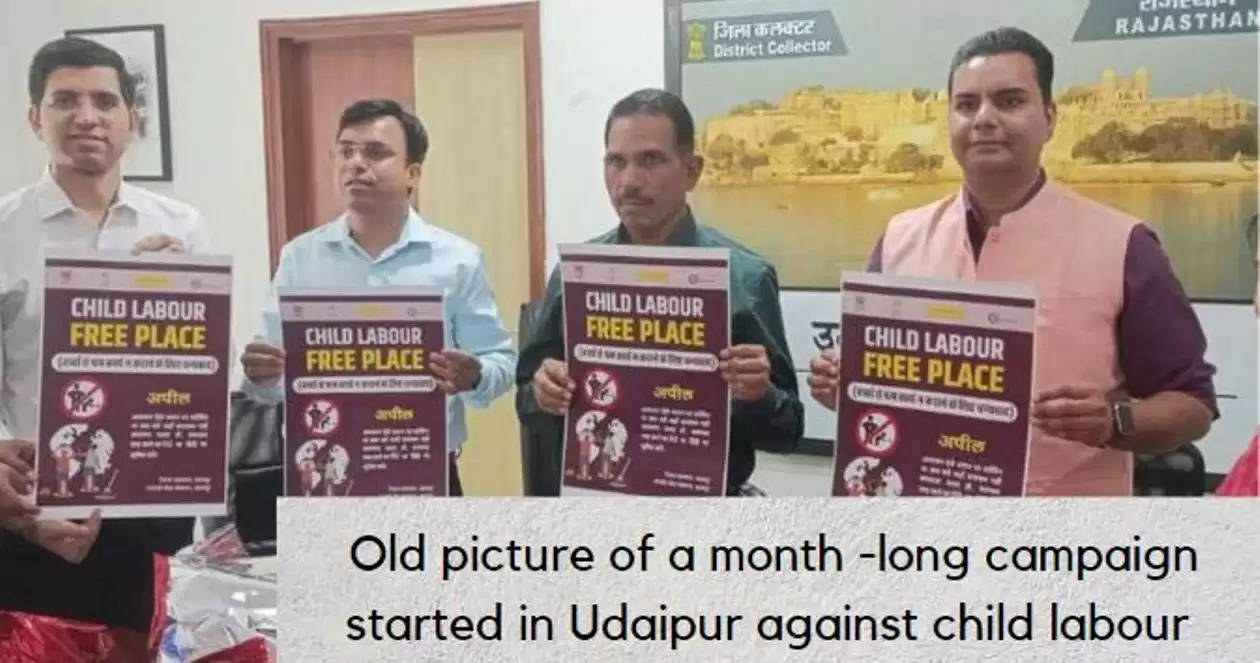Successful campaign in Udaipur leads to rescue of 36 children from Child Labour
16 Criminal cases registered against people for employing child labour
Some shops and factories were given "Child Labour-Free" certificate
In an unprecedented effort, multiple agencies collaborated in a month-long crusade against child labour in Udaipur district, Rajasthan. This concerted campaign yielded remarkable results, as 36 children were successfully rescued from exploitative work conditions. Additionally, the perpetrators responsible for coercing these children into laborious tasks faced the consequences, with 16 criminal cases registered against them. This momentous endeavor showcased the power of coordinated action and underscored the collective determination to combat child labour.
With a mission-driven approach, the administration of Udaipur swiftly initiated a comprehensive campaign to tackle the challenges prevalent in the most underdeveloped blocks of the district. Focused on holistic development, their efforts encompassed a wide array of initiatives. They prioritized reducing the student dropout rate, establishing primary health centers, implementing measures for labor welfare, identifying and assisting malnourished children, and fortifying Anganwadi centers, which serve as educational institutions for pre-primary education. By embarking on this multifaceted mission, the administration aimed to uplift the marginalized communities and create a brighter future for the children of Udaipur.
Shailendra Pandya, the driving force behind the campaign, expressed his intention to develop a "comprehensive strategy" for rehabilitating the rescued child laborers from various settings such as small factories, hotels, kiosks, and shops. As a former member of the Rajasthan State Commission for Protection of Child Rights, Mr. Pandya affirmed that Udaipur was on the path to becoming a beacon of exemplary practices in safeguarding child rights. His vision entailed transforming Udaipur into a model district that prioritizes and upholds the rights and well-being of its children.
Bt cotton fields
Upon the conclusion of the recent drive, the campaign took a commendable step by issuing certificates to shops and commercial establishments where no instances of child labor were discovered. These certificates served as recognition, designating these establishments as "child labor free" zones. Simultaneously, in strict compliance with the Juvenile Justice Act, appropriate actions were initiated at locations where children were found engaged in laborious activities. This combined approach ensured both acknowledgment for responsible establishments and legal measures to address any violations pertaining to child labor.
In the upcoming phase of the campaign, Mr. Pandya revealed plans to address the prevailing issue of child labor in the Jhadol, Kotda, and Gogunda blocks of Udaipur district. Reports indicate that children in these areas are allegedly coerced into working in agricultural fields under the guise of contract farming. Mr. Pandya highlighted a concerning trend, noting that the rapid expansion of Bt cotton crops in these rural pockets is indicative of the employment of children for artificial pollination. This exploitation is evident as these cotton plants are smaller in size compared to conventional cotton crops. The campaign aims to confront this specific form of child labor and take appropriate action to protect the rights and well-being of the children involved.
Thanks to the effective intervention and robust measures undertaken by the State government, the troubling trend of rural families sending their children to work in Bt cotton fields in neighboring Gujarat has come to an end. Mr. Pandya noted that a significant number of rescued children in the city originated from villages within the district. This suggests that despite progress, complete restoration of livelihood opportunities for these families after the pandemic remains incomplete. The observation emphasizes the need for continued efforts to revitalize the local economy, create sustainable livelihood options, and provide support to vulnerable communities, ensuring that no child is forced to engage in labor at the cost of their education and well-being.
Meena Sharma, the assistant director of the Child Empowerment Department and the designated nodal officer for the campaign, explained the process for handling rescued child laborers. She stated that these children were presented before the Child Welfare Committee prior to being sent to shelter homes. To safeguard their well-being and prevent their re-exploitation, the District Child Protection Unit will develop a comprehensive action plan. This plan will encompass strategies and measures to ensure that these children are not subjected to a cycle of labor but instead provided with appropriate care, support, and opportunities for education and personal development.
The collective efforts of child welfare officers from various entities, including police stations, the anti-human trafficking unit, Gayatri Seva Sansthan, Kailash Satyarthi Children's Foundation, and Access to Justice, proved pivotal in the identification and rescue of child laborers. Collaboratively, these agencies worked hand in hand with the police force, conducting unanticipated raids to liberate the children from their exploitative circumstances.
Source: The Hindu
To join us on Facebook Click Here and Subscribe to UdaipurTimes Broadcast channels on GoogleNews | Telegram | Signal



